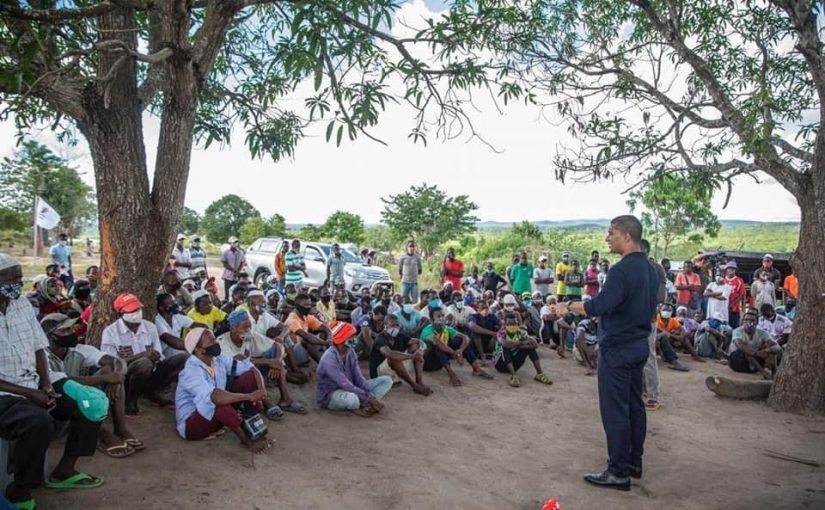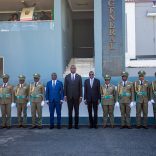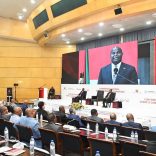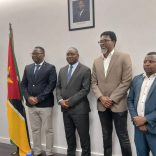European Commission President Ursula von der Leyen meets Mozambique’s President Daniel Chapo | ...
Mozambique: “It’s a day of hope” – government to pump hundreds of millions into Cabo Delgado | Lusa

Photo. Ministério da Agricultura e Desenvolvimento Rural
Dozens of displaced children run through Ntocota, northern Mozambique, the village chosen by the Minister of Agriculture, Celso Correia, to reveal that Cabo Delgado is on the verge of receiving US1.1 billion (€910 million).
“It is a day of hope,” he says.
“Today we are going to sign a US$100 million (€82.8 million) programme. US$700 million (€580 million) has already been approved [by the World Bank], and we believe that within one month we will sign the rest, amounting to US$1.1 billion (€910 million),” the minister overseeing the Integrated Development Agency of the North (ADIN) said at the end of his visit to the Metuge village.
Ntocota will also receive funds donated by the World Bank through ADIN allocations, according to a strategic development plan which is now being finalized.
“Investing a million dollars in one region alone is unprecedented in Mozambique, and will help to solve the problem that we are facing,” Correia underlined.
Also read: Breaking: Armindo Ngunga appointed chairman of ADIN
The focus will be on investing in sustainable development, but the first US$100 million package still intends to respond to the emergency and will be celebrated today at a ceremony in Pemba led by the Mozambican president, Filipe Nyusi.
The donation to ADIN will be delivered to the United Nations Office for Project Services (UNOPS) for the construction of infrastructure and job creation initiatives in the villages for displaced persons.
Ntocota, in Metuge district, hosts about 6,000 people displace by terrorism in Cabo Delgado and forced to start all over again in the middle of the countryside.
Hundreds of reed houses, lined with tarpaulins, signal their recent arrival, with vegetable gardens starting to produce agricultural fare, which Celso Correia says he wants to see again in six months.
“I’m coming back,” he tells the population, explaining to journalists that, in the near future, he expects to see a better schools, better-organised ‘machambas’, water supply, sanitary conditions and houses.
Simpler structures, such as classrooms and health facilities, “may start to be visible” in the Cabo Delgado resettlement villages “within three months”, says Rainer Frauenfeld, UNOPS director for Southern and East Africa, who also visited Ntocota.
In addition to infrastructure, this first phase is expected to create 32,000 agricultural employment opportunities and an equal amount in simplified social services, with initial training of 48 hours and subsequent in-work training.
Celso Correia hopes to be able to take the start-up package to “most of the affected families” and then, “with the resources announced today”, the “desired leap in development” will take place.
At a time when the Southern African Development Community (SADC) proposes to put troops on the ground, Celso Correia underlines that “it is not the military response itself that will solve the problem”, but a combination of factors.
Among them, Minister Correia indicates “investment and development”, as recommended by ADIN, “the training of the Defence and Security Forces (FDS) and the involvement of the region, with its ‘intelligence’ [information gathering] and capacity for anticipation”, anticipating that, with these ingredients, “the next years will be much better”.
So hopes 35-years-old Tamimo Amide.
He was a fisherman in Quissanga, which he fled a year ago when the district headquarters was attacked.
Today, despite the heavy memories of family members lost and having a new plot of land in Ntocota, hunger persists and he is still thinking about returning to the village he was forced to leave.
“If possible, I would like to go back. Home is home,” he summarises.
The minister who oversees ADIN also heard the same desire many times, and notes “a genuine feeling of wanting to return home. The policy of [IDPs] settlement will have to be well thought-out”, and the government’s priority always “to return people to their preferential space, their home”.
Armed groups have terrorised Cabo Delgado since 2017, with some attacks claimed by the jihadist group Islamic State, in a wave of violence that has already caused more than 2,500 deaths, according to the ACLED conflict registration project, and 714,000 people displaced, according to the Mozambican government.
The most recent attack, on March 24, was carried out against the town of Palma, causing dozens of deaths and injuries in numbers yet to be ascertained.
Mozambican authorities regained control of the town, but the attack led oil company Total to indefinitely abandon the main construction site of the gas project scheduled to start production in 2024 and on which many of Mozambique’s expectations for economic growth in the next decade are based.












Leave a Reply
Be the First to Comment!
You must be logged in to post a comment.
You must be logged in to post a comment.